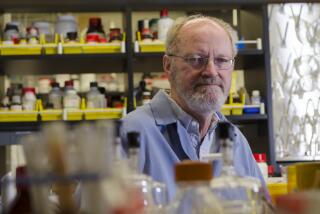Oreste Piccioni, 86; Leader in the Field of Subatomic Physics
- Share via
Oreste Piccioni, a leader in the field of elementary particle physics and emeritus professor at UC San Diego, has died. He was 86.
Piccioni died April 13 at his home in Rancho Santa Fe of complications from diabetes and lung cancer, family members said.
“He was a brilliant and creative genius,” said Thomas M. O’Neill, a former chairman of the physics department at UC San Diego. “In terms of physics accomplishments, [he] was one of the top early elementary particle physicists in the world.”
A native of Italy, Piccioni earned his doctorate at the University of Rome in 1938, studying under the renowned physicist Enrico Fermi.
During the Allied advance in Italy during World War II, Piccioni attempted to flee Axis occupation, but was captured by Nazi troops and held in a prisoner of war camp until a friend bought his release.
Piccioni came to the United States in 1946 and continued his research at the Massachusetts Institute of Technology, Brookhaven National Laboratory in New York and the European Organization for Nuclear Research, known as CERN.
Piccioni contributed to some of the leading work in physics in the last 60 years.
While at the Roman university during World War II, he and his colleagues used makeshift vacuum tubes to test a newly discovered particle then known as the mesotron.
The experiment, conducted in the basement of an Italian high school, was to test the prevailing scientific theory that the mesotron was the carrier of the strong force holding the nuclei of atoms together.
Piccioni’s experiment, however, proved that mesotrons were not the connective force in the nuclei.
While at Brookhaven, Piccioni visited the Lawrence Livermore Lab run by UC Berkeley and conferred with Owen Chamberlin and Emilio Segre, offering suggestions on their work that led to the discovery of antiprotons in 1955.
Several years later, Chamberlin and Segre were awarded the Nobel Prize in Physics for their antiproton discovery.
Piccioni maintained that he had made important contributions to their work and, in 1972, filed a civil suit against the two scientists, seeking $125,000 in damages and a public acknowledgment of the importance of his contributions. A court dismissed the suit, however, after ruling that it had been filed too late.
In 1999, he was awarded the Matteucci Medal from the Accademia Nazionale Delle Scienze of Italy for his seminal contributions to particle physics.
Piccioni is survived by his wife, Marina; five children; and four grandchildren.




